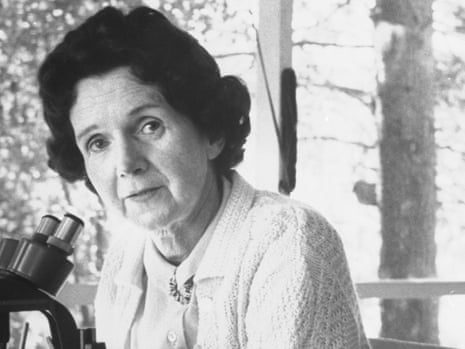In October, the Royal Society, one of the oldest and most respected scientific institutions in the world is hosting an event with the Royal Literature Society, marking the 50-year anniversary of Rachel Carson’s death. Taking Silent Spring, her most famous work on the environmental consequences of chemical pesticides (or biocides as she preferred to called them) as the inspiration, Writing Wrongs promises to “discuss the complementary roles of literature and science in saving the planet”.
The problem is, Writing Wrongs has an all-male panel.
Debates about gender-balanced panels at conferences and public events are not new. In 2009 the group Feminist Philosophers set up a Gendered Conference Campaign, challenging the prevalence of all-male conferences in their field. In 2011, a group of gender equality advocates and activists pledged to boycott events with all-male panels. Then, in early 2013, journalist Rebecca Rosen took the rather novel step of asking men to sign a pledge to refuse speaking at or moderating events dominated by male contributors. More than 300 people signed the online pledge. But, within hours, it had to be anonymised because of the torrent of abusive comments.
Trolls aside, these initiatives have raised the profile of unconscious bias when selecting speakers. A common concern is that initiatives like those mentioned above might lead to tokenism. But as Rosen rightly pointed out in a later article, this assumes that the reason women aren’t on panels is because they are not as well qualified. Others argued that it is not the lack of female speakers that is the problem, but rather the reluctance, or in my view, the sheer laziness of organisers to find them. It is also worth noting that women may be more likely to turn down speaking engagements than men. So asking once, only to be turned down, is simply not an excuse.
Earlier this week I wrote to the Royal Society asking why Writing Wrongs had an all-male panel. I even offered some suggestions for female speakers they might like to ask. My argument was that Carson is not only the most famous environmentalist and nature writer of the 20th century; she was also a female scientist who faced gender-based slurs from the mainstream media and naturally, vested interests, on the publication of Silent Spring. Keen to discredit the conclusions of her detailed analysis they dismissed her as a hysterical woman, unable to conduct objective research.
Not only was it strange to see an all-male panel, especially when I knew plenty of female science writers, academics and environmental journalists who would have been equally qualified to speak, it seemed entirely inappropriate given who had apparently inspired this event.
Carson did not come from a privileged background. Her parents owned a small farm in Pennsylvania. And, when she won a college scholarship, her parents sold off lots of their land to make up the difference. Her promising academic career stalled when she had to cut short her postgraduate degree at Johns Hopkins University due to family and financial pressures. Instead she took a position as an aquatic biologist with the US Fish and Wildlife Service, supplementing her meagre salary – which had to support her mother, siblings and their children – by publishing her writing. According to environmental historian, Linda Lear, who has written extensively on the life and works of Carson, as a female scientist (and at that time, only the second to ever be employed by The Service) her career would have progressed at a snail’s pace compared to her male counterparts. Fortunately, Carson’s work increasingly led her away from the field and laboratory and into public information and editing. Here, women were more traditionally employed and accepted. And, although she was not promoted as fast as she might have been, she made steady progress, being exceptionally lucky in supervisors, willing to recognise her talents.
The Royal Society responded to my email. They’d asked a female chair, but she was unavailable. I was then told they were looking into other female speakers, but had needed to proceed with promotion of the event. Is it really that hard to find a female science writer or a leading academic working on pesticides? Not if you live in the 21st century and know how to use the Internet, write an email or operate a phone. I was then reassured, that sometimes; the Royal Society does have female representation on at important events. This was followed by some blurb and a link to their Equality and Diversity policy. Unfortunately, whenever I have challenged other event organisers on the lack of gender-balance, I have pretty much had the same response.
Gender-balanced panels aren’t a sign of tokenism. They signal event organisers have asked the question: is the panel we’re proposing representative of the community of authority (and might I add, the audience)? In this case (and very likely in all cases), a panel of white men is not. The Royal Society should right this wrong.
Dr Victoria Johnson is a researcher at the Welsh School of Architecture, Cardiff University, studying historical energy transitions. She previously lead the climate change and energy programme and the New Economics Foundation and holds a PhD in Atmospheric Physics from Imperial College.

Comments (…)
Sign in or create your Guardian account to join the discussion